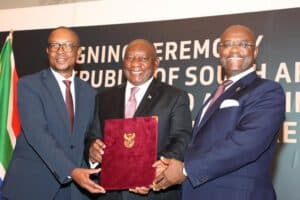President Cyril Ramaphosa launched another commission of inquiry on Sunday, but how impactful have the previous inquiries been?

President Cyril Ramaphosa’s expected announcement of a commission of inquiry into policing matters is giving citizens a case of déjà vu.
KwaZulu-Natal Police Commissioner Lieutenant General Nhlanhla Mkhwanazi rocked the security cluster earlier this month with accusations of interference and criminal culpability against high-profile individuals.
Forced to act, the president’s announcement on Sunday evening was ridiculed by rival political parties and civil society groups demanding swift action.
A decade of commissions
Ramaphosa has successfully relied on commissions of inquiry to settle complex disputes, while former president Jacob Zuma had a less impressive record with the commission he chose to implement.
Acting Deputy Chief Justice Mbuyiseli Madlanga will chair this commission into Mkhwanazi’s revelations, marking the second inquiry in 2025, following President Ramaphosa’s May announcement of an investigation into the delay in investigating Truth and Reconciliation Commission matters.
Nugent Commission into Sars
Possibly the most impactful, the Nugent Commission into the South Africa Revenue Service (Sars) was launched in May 2018.
Chaired by retired Judge Robert Nugent, it investigated governance and operational failures under then-South African Revenue Service (Sars) Commissioner Tom Moyane.
Moyane was suspended in March 2018 and subsequently fired, with his lengthy court appeal ending in failure.
The Nugent Commission led to the appointment of Edward Kieswetter, who has been credited with successfully reforming Sars.
Zondo Commission into State Capture
The largest judicial inquiry undertaken took four years and implicated more than 1 400 people based on the testimonies of roughly 300 witnesses.
Handed to President Ramaphosa in June 2022, former Chief Justice Raymond Zondo’s State Capture report had, as of January, resulted in the arrest of 38 natural and juristic persons.
ALSO READ: Kubayi: NPA capacity up as state capture cases progress
However, the biggest names implicated in the State Capture report remain unprosecuted, including the former president and current ministers.
“Since [Ramaphosa’s] first speech as ANC leader, we have failed to see any material action being taken against those within the ANC who were involved in corruption,” stated the Democratic Alliance.
Mpati Commission into PIC
In October 2018, Ramaphosa launched a commission inquiry into the management of the Public Investment Corporation.
Held over 63 days, 77 witnesses gave oral submissions to the commission chaired by Justice Lex Mpati.
Dr Dan Matjila resigned from his PIC CEO post before the commission concluded, but he and others connected to the companies implicated in wrongdoing have not been prosecuted.
“Matjila’s requests to provide financial assistance or make contributions to individuals, organisations and political parties reflect his abuse of office and the ability to exert undue influence over investee companies,” concluded the report.
Marikana
Ramaphosa’s predecessor launched the Marikana Commission of Inquiry in August 2022, but the future president was linked to the massacre for another decade via a class action lawsuit.
Ramaphosa was a shareholder and non-executive director of Lonmin Platinum when 34 protesting miners were killed by police.
The commission cleared Ramaphosa despite leaked emails where he asked law enforcement to take “concomitant action”, as reported by Al Jazeera.
Former North West Deputy police commissioner William Mpembe and five others were charged for their involvement in the massacre, but all six were acquitted in September 2024.
Seriti and Life Esidimeni
Two other less-flattering inquiries from the Jacob Zuma era were the Seriti Commission into the military spending and the inquiry into the Life Esidimeni tragedy.
After R140 million in expenditure, the findings of the Seriti Commission were set aside after it was determined that “questions posed to the witnesses were hardly the questions of an evidence leader seeking to determine the truth”.
Meanwhile, Section 27 is still fighting for the families of the 144 Life Esidimeni psychiatric patients who died while under the care of the Gauteng Department of Health.
Section27 asked the National Prosecuting Authority to prioritise the prosecution of provincial health officials Qedani Mahlangu and Makgabo Manamela as recommended by former Deputy Chief Justice Dikgang Moseneke.
“We hope to bring back into the spotlight the plight of the families whose loved ones died gruesome deaths at the hands of the state,” wrote Section27.
NOW READ: Cameron questions urgency of commission into Mchunu probe
Support Local Journalism
Add The Citizen as a Preferred Source on Google and follow us on Google News to see more of our trusted reporting in Google News and Top Stories.








